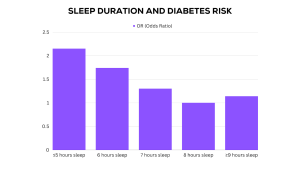Sleep and metabolism are two fundamental aspects of human health that are closely intertwined. While sleep is essential for physical and mental restoration, metabolism governs energy production and utilization in the body. Recent research has illuminated the fascinating connection between sleep patterns and metabolic processes, demonstrating their mutual influence.
Comprehending this link could have significant implications for how we approach improving overall health and managing metabolic disorders. In this article, let us explore the link between sleep and metabolism.
The Physiology of Sleep
To comprehend the relationship between sleep and metabolism, it’s essential to understand the physiology of sleep.
Sleep is a dynamic process that can be divided into several stages, including non-rapid eye movement (NREM) and rapid eye movement (REM) sleep. The circadian rhythm, often referred to as the body’s internal clock, regulates our sleep-wake cycles, ensuring we feel awake and alert during the day and sleepy at night.
When exploring the link between sleep and metabolism, it is essential to consider various factors that can influence sleep quality, including beds, sleep positions, and pillow choices. For side sleepers, finding the best pillow that provides proper support to the neck and spine is crucial. The best pillow for side sleepers helps maintain a comfortable and aligned sleeping position, which can improve the overall quality of sleep.
Overall, sleep plays a vital role in restoring the body physically and mentally, supporting various physiological functions.
Links Between Sleep and Metabolism
The links between sleep and metabolism are increasingly becoming a focal point of scientific inquiry. Numerous studies and experiments have supported this and continue researching through it to find the inferences.
Here are some additional links between sleep and metabolism:
The Impact of Sleep Deprivation on Metabolic Processes
Sleep plays a critical role in maintaining metabolic homeostasis, which refers to the body’s ability to regulate its internal balance. On the other hand, lack of sleep disrupts the delicate hormonal balance and impairs various metabolic processes.
A significant study on the consequences of sleep deprivation on metabolic health shows a direct link to diabetes and blood glucose levels. Participants who were restricted to just four hours of sleep per night for five consecutive nights experienced a substantial decrease in insulin sensitivity, comparable to the early stages of diabetes. Remarkably, the researchers observed an average reduction of 40% in glucose metabolism
These findings underscore the detrimental impact of insufficient sleep on glucose metabolism and hormonal equilibrium. Understanding the effects of sleep deprivation serves as a crucial stepping stone for delving deeper into its influence on specific aspects of metabolism. As we gain further insights into this relationship, we can devise more effective strategies to promote better sleep and metabolic well-being.
The Role of Sleep in Glucose Regulation and Insulin Resistance

The impact of sleep on glucose regulation and insulin sensitivity cannot be understated. Both the quantity and quality of sleep play pivotal roles in maintaining optimal glucose levels. Poor or insufficient sleep has been consistently associated with impaired glucose tolerance and insulin sensitivity.
Findings from numerous studies underline the potential dangers of sleep deprivation on glucose metabolism, which raises the risk of insulin resistance over time and increases the likelihood of developing type 2 diabetes in the future.
To safeguard against such metabolic disorders, prioritizing sufficient and high-quality sleep is of utmost importance. By doing so, individuals can maintain glucose homeostasis and promote insulin sensitivity, thus reducing the risk of developing chronic metabolic conditions.
The Influence of Sleep on Hormonal Balance and Appetite Regulation
Beyond its effects on glucose regulation, sleep plays a crucial role in modulating hormones that govern appetite and satiety. Insufficient sleep disrupts the delicate balance of key hormones involved in regulating hunger and fullness.
When we don’t get enough sleep, levels of the “hunger hormone” ghrelin tend to rise, while levels of the “satiety hormone” leptin decrease. This hormonal imbalance primes the body to experience increased feelings of hunger and reduced sensations of fullness, leading to a heightened appetite.
A compelling study further illustrates this relationship, revealing that restricting sleep to just 4 hours a night for two consecutive nights resulted in a significant 22% increase in caloric intake. Such an energy imbalance over time can contribute to weight gain and increase the risk of obesity.
Moreover, the impact of insufficient sleep on appetite-regulating hormones fosters a cycle of increased appetite and overeating, ultimately leading to unwanted weight gain and a higher susceptibility to obesity in the long term. Prioritizing adequate sleep is thus crucial not only for metabolic health but also for maintaining healthy body weight and overall well-being.
Sleep Disorders and Their Impact on Metabolic Health
For many individuals, the struggle to get adequate sleep can be attributed to underlying sleep disorders that disrupt normal sleep patterns. One prevalent sleep disorder is obstructive sleep apnea (OSA), characterized by repeated interruptions in breathing during sleep, leading to shallow breathing and reduced oxygen levels.
The consequences of OSA extend beyond mere sleep disruption. The condition triggers the release of stress hormones, which in turn disrupt glucose metabolism and promote insulin resistance. Moreover, studies have found that approximately two-thirds of individuals with OSA also suffer from insulin resistance or type 2 diabetes. Although this might be the case, there is hope, as treating OSA with continuous positive airway pressure (CPAP) therapy has been shown to improve insulin sensitivity and alleviate its metabolic impacts.
Insomnia, another common sleep disorder, has also been proven to be associated with impaired glucose metabolism and an increased risk of diabetes. These findings highlight that any form of disrupted sleep, regardless of the cause, can have a negative impact on metabolic health.
Overall, addressing sleep disorders and promoting better sleep hygiene can be instrumental in safeguarding metabolic health and reducing the risk of associated chronic conditions.
The Role of Lifestyle Factors in Sleep and Metabolism
Lifestyle factors wield significant influence over the quality of our sleep, which, in turn, affects our metabolic health. Choices related to diet, exercise, and stress management all play essential roles in determining sleep quantity and quality.
Regular physical activity during the day has been shown to promote more restful sleep at night. On the other hand, consuming heavy meals, alcohol, or engaging in excessive screen time before bedtime can disrupt sleep patterns. Moreover, stress management techniques such as yoga or meditation can help lower cortisol levels and contribute to improved sleep quality.
By adopting healthy lifestyle habits, individuals can enhance both the duration and quality of their sleep. Consequently, this positively impacts key metabolic health parameters, including glucose regulation, hormonal balance, and body weight.
The interplay between lifestyle choices, sleep, and metabolism underscores the importance of adopting holistic approaches to improving overall well-being.
Frequently Asked Questions
- How does sleep deprivation affect our metabolism?
Sleep deprivation impairs glucose metabolism, increases insulin resistance, alters hormone levels, boosts appetite, and promotes weight gain. This puts us at higher risk of obesity, diabetes, and metabolic syndrome.
- What is the connection between sleep and weight gain?
Insufficient sleep increases hunger hormones like ghrelin while decreasing satiety hormones like leptin. This drives increased calorie consumption and subsequent weight gain over time.
- How can improving sleep quality help in managing metabolic disorders like diabetes?
Getting enough high-quality sleep helps maintain glucose homeostasis and insulin sensitivity. By controlling blood sugar levels and insulin needs, good sleep supports diabetes management.
Closing Thoughts
Emerging research makes it clear that sleep and metabolism have a multifaceted, bi-directional relationship. Insufficient or disrupted sleep impairs glucose regulation, alters hormone levels, increases appetite, and promotes weight gain. These effects compound over time, leading to increased obesity, diabetes, and metabolic syndrome risk.
Prioritizing good sleep hygiene, adopting healthy lifestyle habits, and addressing sleep disorders can have a positive impact on metabolic health and have far-reaching benefits for maintaining metabolic homeostasis and preventing chronic disease.
As we continue to delve into this field, it becomes increasingly evident that sleep is not merely a passive state but a crucial determinant of overall health and well-being. Taking steps to improve sleep quality and duration may prove to be valuable strategies in promoting metabolic health and preventing associated disorders.


 Home
Home








